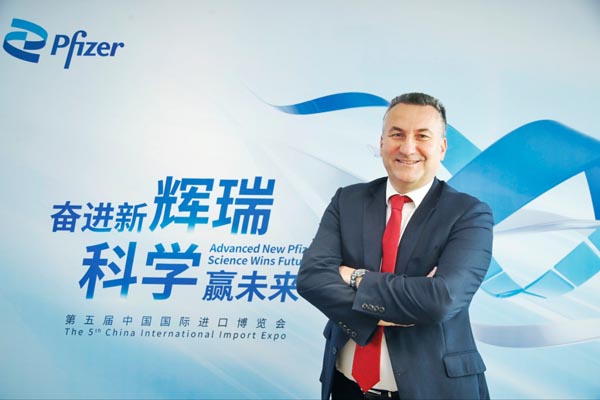

Local R&D
On top of importing innovative products, the company said it has introduced cutting-edge technology and innovative ideas into the country, bolstering advances in local research and development.
It set the goal in 2020 that by the end of 2022, its operations in China will participate in more than 80 percent of early phase of the group's clinical research, as well as its pivotal clinical research worldwide, and 80 percent of the research projects will seek approval from Chinese authorities, a company statement said.
The initiative aims to enable China's deep involvement in the company's global R&D process as soon as possible, especially in the early phase of clinical research, thus giving Chinese patients earlier access to Pfizer's world-leading innovative treatment solutions, according to the statement.
With a series of policies, regulations and guidelines issued by the State Council, China's Cabinet, as well as the National Medical Products Administration, to streamline drug approval procedures, encourage innovation and improvement in drug quality and strengthen drugs' full life-cycle management, the country has made significant progress in this regard, Pointeau said.
That has no doubt boosted the faith of several foreign-funded businesses, including Pfizer, in taking root in the Chinese market for the long run, he noted.
Thanks to the Chinese government's encouraging policies on innovation released in recent years, the pace of the innovative drug registration in the country can largely rival that of developed countries, he added. Pointeau cited an anti-COVID oral drug developed by Pfizer and one of its German R&D collaborators as an example. Benefiting from the country's continuously optimized procedures for drug approval, the medicine took just slightly more than two months to be approved and shipped to the front line of the fight against the disease.
The pandemic outbreak has had a huge impact on the world over the past three years, which has also spurred the pharmaceutical sector to innovate business models.
Pfizer is advancing the digital transformation of its business operations and provides digital solutions. The move will change the interaction between the company and patients, as well as medical workers, better assisting them with health education and disease management and expanding the market coverage of its innovative product lineup, Pointeau said.
County-level services
In response to the central government's call for rural vitalization, Pfizer has founded a marketing team dedicated to medical services at the county level composed of more than 550 members.
Compared with first-tier metropolises, many county-level regions are short of premier medical resources. Targeting the imbalance in the vast Chinese market, the company is cooperating with trade associations to help improve therapy at the grassroots level.
Through innovative digital tools and models, Pfizer popularizes the management philosophy for drugs at hospitals in counties to improve access to and standardization in clinical medication, according to the company.
By offering its digital products and solutions, the company also helps to advance the cooperation between large hospitals and grassroots-level medical service providers, Pointeau said.
Many of China's trades are at the forefront of the world in terms of innovation, he noted, adding that the pharma industry needs to accelerate innovation, which will help a growing number of innovative drugs developed in China to go abroad.
As a foreign-funded pharmaceutical company, Pfizer will actively collaborate with local businesses to share technological expertise, he added.
The president, who has worked in Shanghai since 2011, is witness to the country's economic transformation and steady progress in opening-up.
The 20th National Congress of the Communist Party of China held in October signals that the Chinese government is determined to continue the country's opening-up, he said. "That means a greater influx of foreign investment into the world's second-largest economy in the future."